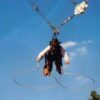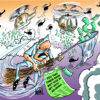Census reveals migrants tend to be more highly educated. So why do they find it harder to land jobs?
![]()
Census reveals migrants tend to be more highly educated. So why do they find it harder to land jobs?
Posted Yesterday at 10:55am, updated 6h ago6 hours ago
Help keep family & friends informed by sharing this article
abc.net.au/news/higher-education-with-worse-job-outcomes-is-the-reality-for-many/101542354COPY LINKSHARE
Few people have a CV as impressive as Amin Niazai.
Key points:
- New census data reveals that migrants have an average higher level of education than people born in Australia
- Many migrants struggle to find work or are employed well below their education levels
- Skilled professional migrant training courses are not widely available in Australia
The 35-year-old Afghan-born Melburnian is a forest ecology and climate change scientist with a master’s degree and a PhD from Kyoto University in Japan.
He led climate change adaptation and natural resource management in Afghanistan and headed projects for international groups including the United Nations Food and Agricultural Organisation, the US Department of Agriculture and AusAid.
He is fluent in four languages.
But in Australia, Dr Niazai has struggled to find work in his field.
New census data released this month revealed that on average, migrants like Dr Niazai have a higher level of education than people born in Australia, but many are employed well below their education levels or struggle to find work at all.
The census results released by the Australian Bureau of Statistics showed more Australians than ever were continuing their studies with more than 11 million holding vocational or tertiary qualifications. That’s a 20 per cent increase since 2016.
While 56 per cent of people born in Australia had post-school qualifications, this number jumped to 63 per cent for those born overseas and 82 per cent for Australians born in India and Bangladesh.
Educated migrants face a ‘frustrating’ search for work
In Afghanistan, Dr N

































![Lieutenant-Colonel Robert Rogers (7 November 1731 – 18 May 1795) was a British Army officer and frontiersman. Born in Methuen, Massachusetts, he fought in King George’s War, the French and Indian War and the American Revolutionary War. During the French and Indian War, Rogers raised and commanded Rogers’ Rangers, a ranger unit trained for carrying out asymmetric warfare.[2][3](https://www.cowboyron.com/wp-content/uploads/2022/05/1262463_580743685323360_2133853937_o1-1-150x150.jpg)
















![Billie Joe Armstrong & Norah Jones – Silver Haired Daddy Of Mine [Music Video]](https://www.cowboyron.com/wp-content/uploads/2022/11/Al_St._John1-100x100.jpg)























